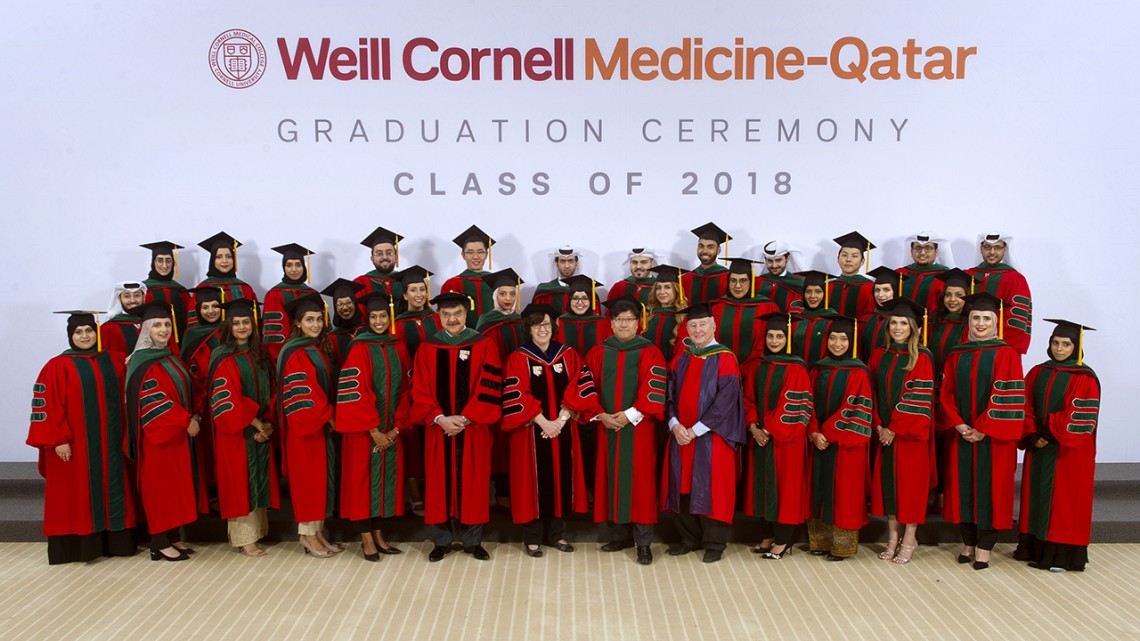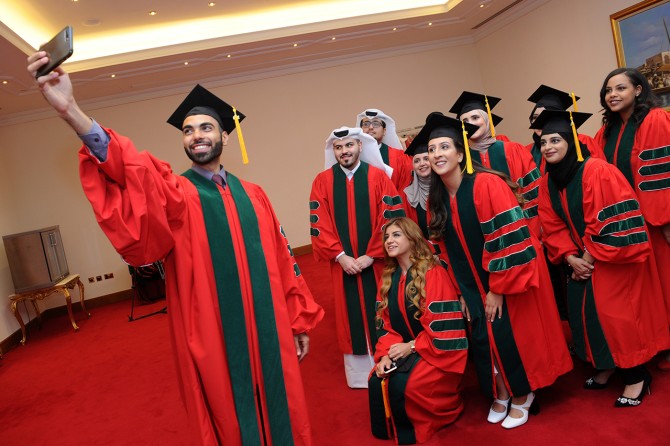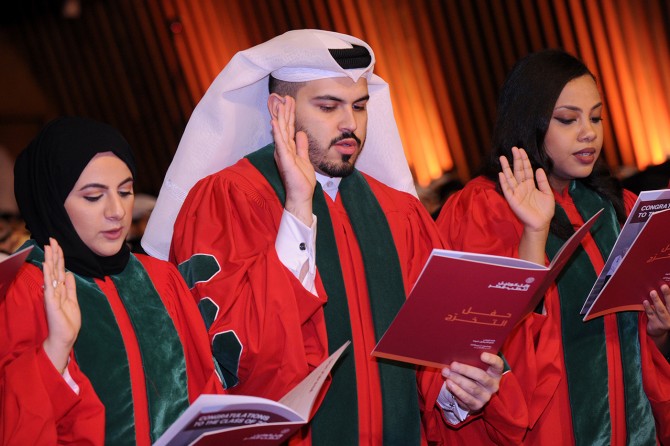
Weill Cornell Medicine-Qatar’s Class of 2018, with Dr. Javaid Sheikh, Cornell President Martha E. Pollack, Dr. Augustine M.K. Choi and Dr. Antonio M. Gotto, Jr.
Weill Cornell Medicine-Qatar celebrates Class of 2018
Weill Cornell Medicine-Qatar welcomed 34 new doctors – including 13 Qatari nationals, the most in one year for the institution – into the medical profession during commencement May 2.
Graduates in the Class of 2018 received their Cornell University medical degrees during a ceremony at the Sheraton Hotel in Doha, in front of family, friends and WCM-Q faculty and staff. Under the patronage of the Qatar Foundation, WCM-Q has now graduated 335 doctors since the first class of medical students in 2008.
“Graduation is the highlight of the academic year; it is the culmination of everything that we strive for,” said Dr. Javaid Sheikh, dean of WCM-Q. “The students in the Class of 2018 have demonstrated great commitment to their studies, intellectual curiosity and compassion for their patients. These qualities will continue to grow and develop as they progress through their careers and care for their patients in Qatar’s hospitals and the wider world.
“This year is also particularly significant because of the number of Qatari nationals who are graduating today,” he added. “More than a third of the Class of 2018 are national citizens and this is testament to the vision of Qatar’s leadership of creating a knowledge economy and a hub of biomedical excellence within the region. Qatar Foundation, under the guidance of HH the Emir, HH the Father Emir, HH Sheikha Moza, and HE Sheikha Hind, is developing national human capacity and creating a sustainable society for generations to come.”
The new doctors will join the ranks of fellow alumni, completing residencies at Hamad Medical Corp. and other hospitals throughout the world. And while they will go their separate ways, they all share a unique bond as physicians.
“This privilege that we have of education, trust and insight into people and their stories makes us the voice of the vulnerable, whatever voice that may be,” class speaker Fatima Al-Maadid told her fellow graduates. “In a world that oppresses this truth and tries to forget humanity, in a world where cynicism eclipses idealism, your voice is to personify people and the world of possibilities. Do not take the responsibility lightly.
“These voices also make our journeys in the realm of medicine so varied. We will go into different specialties, the class being made up of internists, pediatricians, neurologists, obstetricians, surgeons, family physicians, anesthesiologists, ophthalmologists and child neurologists,” she added. “This is the reality of modern medicine and we will be separated in our realities but what will unite us is the principle to care, to discover and teach, all in the pursuit of wellness of people. Whatever you do, I am confident that I am in the presence of leaders of change and growth.”
Joining in the celebration were keynote speaker Dr. Mashael Al-Khelaifi, a pediatric anesthesiologist at Hamad Medical Corporation; President Martha E. Pollack, who conferred the medical degrees upon the Class of 2018; and Dr. Augustine M.K. Choi, the Stephen and Suzanne Weiss Dean of Weill Cornell Medicine in New York and provost for medical affairs at Cornell University.
“Medicine is a lifetime commitment,” Choi said. “As you go through your residency programs, you’ll discover that finding compassion and ways to truly care for your patients are not things you can learn overnight. It is a lifelong process that takes discipline and perseverance. Continue to work at it every single day. The goal is to have the greatest, most positive impact on the health and wellbeing of others.”
Choi also highlighted the importance of professional growth.
“Medicine and healthcare will continue to change, probably very rapidly, in the years to come,” he said. “It’s your responsibility to keep up with the latest advances, so that you can offer your patients the very highest quality of care possible. Keep learning and developing new skills. Being the best doctor you can be is about growing, learning and continually moving forward.”
Media Contact
Get Cornell news delivered right to your inbox.
Subscribe


